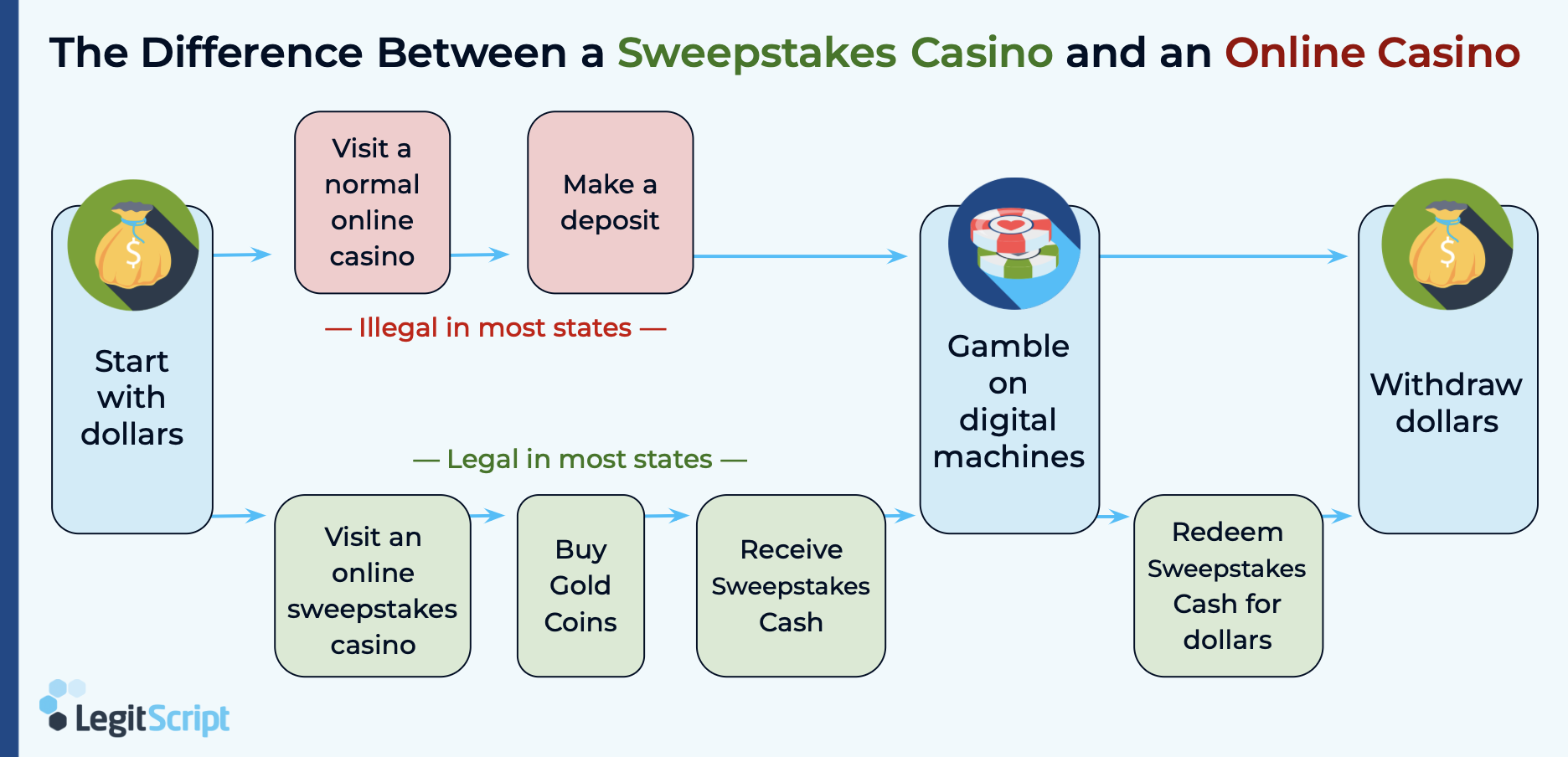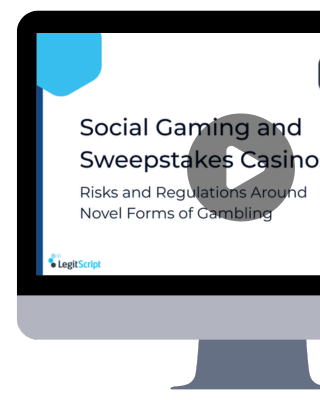Many online casinos have adapted their business model to offer free-to-play sweepstakes to avoid gambling regulations, creating a gateway for young audiences to enter the world of betting. Governments and payment providers alike face challenges as they navigate shifting laws.
LegitScript helps keep you informed on this dynamic legal landscape in jurisdictions throughout the world so you can keep your customers safe. For more information on social gaming, register for our webinar.

July 15, 2025 | by Erin Feebeck
How “No Purchase Necessary” Casinos Skirt Regulation

Sweepstakes casinos like this one follow the rules of a sweepstakes to circumvent gambling restrictions.
LegitScript has identified a rise in “free to play” casinos, also known as social casinos or sweepstakes casinos, which use a “two-coin” system to bypass gambling laws. Players buy one type of coin (like arcade tokens) and receive additional sweepstakes coins, which can be exchanged for prizes or money. These platforms also offer free coin events to legally define their services as sweepstakes, enticing players to spend more by limiting free gameplay.
Another strategy employed by these social casinos is to offer free coin events, ensuring their services can be legally defined as sweepstakes. Additional tactics employed by online casino platforms include offering free coins as a reward for daily play or through free sweepstakes giveaways. Technically, players do not have to pay to receive these coins but the amount players receive for free often limits gameplay and in turn encourages additional spending. Many social casinos also offer free coins as a reward for daily play, which in turn encourages the purchase of extra coins.
This loophole allows social casinos to advertise as legal alternatives to traditional online gambling. This practice, however, raises legal concerns in jurisdictions where social casino gambling is illegal, such as in Washington State or Japan.

Jurisdictional Spotlight: Japan’s Online Gambling Epidemic
In Japan, a survey by the National Police Agency (NPA) found that only 40% of online casino users know their activity is illegal. Social casinos, similar in gameplay to Japan’s legal brick-and-mortar Pachinko parlors, take advantage of regulatory ambiguity, often targeting Japanese audiences without clear warnings about their illegal status. In a review of 40 online casinos, the NPA found that for half of them, more than 90% of user traffic originated from Japan.
A rise in online gambling during the pandemic has also correlated with a surge in gambling addiction, particularly among young people. The Asahi Shimbun, a major national newspaper , reported an increase in gambling addiction cases, with more than 28% of those in debt reporting actions such as borrowing money from the black market or stealing from relatives and workplaces. In response, Japan’s government has banned online casino ads, including promotional “Top Ten” ranking sites, in an effort to curb the growing social and regulatory concerns surrounding online gambling.
Gacha Games and Loot Boxes – A Gateway to Gambling
Many social casino sites allow minors to play due to weak age verification systems, despite being advertised as 18+. The FTC has warned of the risks to underage youths accessing gambling websites due to inadequate age restrictions. In several cases, online casinos were found to be easily accessible without age verification, and ads promoting these platforms appeared on unrelated, child-accessible websites — exposing youth to gambling content even before visiting the sites. Many online games are implementing loot boxes into their gameplay to appeal to minors. Loot boxes are virtual rewards containing in-game items that can be purchased with real money. Gacha games, another loot system used to target minors, get their name from Japanese Gachapon, a type of popular capsule toy vending machine. The random rewards from these games are intended to draw players into spending real money, often using popular online influencers to advertise their games.
A study on the American Psychological Association website found 20% of participants were introduced to gambling via loot boxes, and over 80% began purchasing loot boxes before the age of 18. Whether Gacha games and loot boxes can be considered gambling, studies show they play a factor in addiction. Additionally, a survey conducted by the Gambling Health Alliance showed 13% of gamers had accumulated debt due to loot boxes, 9% had borrowed money they couldn’t repay, and 15% had taken money from their parents without permission.
LegitScript Keeps You Informed
LegitScript specializes in compliance monitoring across global jurisdictions. Our team of experts and analysts helps payment providers identify high-risk merchants, reduce exposure to regulatory action, and protect your brand and customers. Contact us to learn more about our risk management solutions.





